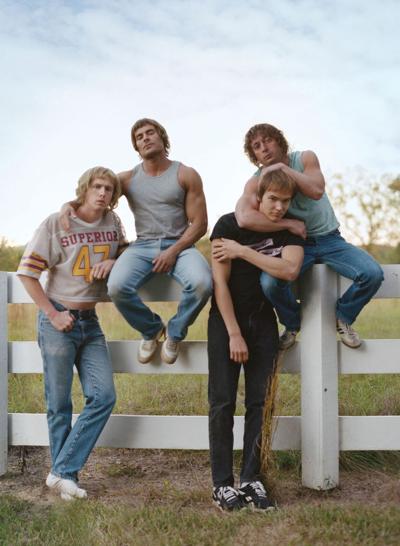
The Iron Claw
Wrestling obsessives often struggle to convey the gravity of a certain match or storyline to normies.
Casuals — or the otherwise heretofore uninterested — are nevertheless usually sucked in by the performances. Pro wrestlers are larger-than-life physically with outsized personalities to match. Their athleticism is undeniable, and sociologists and anthropologists and other ivory-tower types can explain why humans are drawn to displays of violence and the particular appeal of the type of “safe” violence on display inside the squared circle where, usually, no one’s actually getting hurt.
And even a new observer can usually grasp the basic stakes and structure of most every match. This guy hates that guy for some reason (usually jealousy of one flavor or another; the Greeks were on to something), and they are fighting. We want the good guy (he’s usually good-looking but not in a threatening way) to beat the bad guy (usually ugly or way too good-looking and probably wearing white boots).
That’s why people watch wrestling. But people get obsessed with wrestling — watching for decades and decades — because it lends itself to great big stories that can stretch out over a lifetime. Anybody could watch, for example, Sami Zayn and Kevin Owens win the tag-team titles over the Usos at Wrestlemania 39 and enjoy it and even understand why the match was subjectively good. But to really get it, you’d have to be invested in the storyline, which for Zayn and Owens stretches back to 2007.
And that is the great triumph — and the great shortcoming — of The Iron Claw, director Sean Durkin’s latest for A24. If you’re already invested in the characters because you know the story, it’s engrossing. If you don’t, you can admire the performances and understand the arc, but Durkin struggles to get you to care outside the confines of the film. The director has said in interviews that as a wrestling fan, he’d been obsessed with Texas’ Von Erich family and their eponymous curse and had wanted to tackle the tale on celluloid. Those of us who already know the story understand why.
Early on, eldest brother Kevin (Zac Efron) lays out in a voiceover his belief in the family curse. Much has been made of Efron’s physical transformation for the film, and indeed the former kid star is impressively beefy. Efron’s performance is exquisite, if muted, almost as if Kevin is bound up by the crushing weight of his family’s destiny — its curse. He’s premodern in his unquestioned belief in it. He’s on a train with an inevitable destination, and the doors are locked.
It’s all “prearranged,” just as the Von Erichs’ matches are, as Lily James — playing Kevin’s love interest — explains in one of many, many, many, many long stretches of exposition. James is darling in her role, which serves as a surrogate for anyone watching the movie who isn’t terribly invested in wrestling going in.
The rest of the characters are deeply invested in wrestling, starting with the Von Erichs’ patriarch, an old fighter named Fritz who pushes his sons to do what he could never do by leading them to the top of the Texas-based promotion he heads. This inevitably leads the brothers to compete in reality as well as in kayfabe. (Fritz, played by a gruff Holt McCallany, actually ranks his children; it would come across as a heavy-handed modernization of King Lear, except this is a thing that actually occurred.) Kevin’s brothers — Kerry (The Bear’s Jeremy Allen White), David (Harris Dickinson) and Mike (Stanley Simons) — all have their turn vying for their father’s respect and attention. Meanwhile Fritz pushes his sons to get what he never got, and the brothers learn that the only people they can rely on are each other. It’s nearly impossible to miss all this familial subtext, but if you do, don’t worry: One character or another will make it explicit through direct address, as Durkin, who has proven he can be a subtle director in the past, falls into the all-too-common 2020s film trap of having characters tell the audience exactly what the movie is trying to say. But hey, wrestling’s not subtle either.
The wrestling itself is extremely well-done, with the actors obviously invested in the training. There are many bad wrestling movies with actors who are very bad wrestlers, so bravo to Chavo Guerrero Jr., who served as technical adviser and makes an appearance (as numerous wrestlers do, playing other wrestlers, a nice Easter egg for the fans — though I doubt many non-fans would care very much that Dolph Ziggler’s brother plays Gino Hernandez). The behind-the-scenes, locker-room portions of the film are also interesting looks into how wrestling works, or at least how it worked in Texas in the 1970s or ’80s.
The movie’s deeply sad third act is easily the finest — and best-paced — part of the film, as the family’s destiny reaches the foregone conclusion and the Von Erichs transition to the tragic footnote they are in the annals of the sport they didn’t really love.
Wrestling fans will love The Iron Claw as a period piece about a chapter in wrestling lore that has begged to be given the big-screen treatment for decades. Casuals can appreciate the performances, particularly of Efron and James, who both deserve the plaudits they’ve already received, but might leave failing to understand why the fans love it so much.
And that might make The Iron Claw the ultimate wrestling movie, but not the best — a title still held by The Wrestler.





